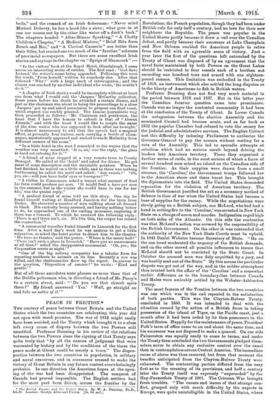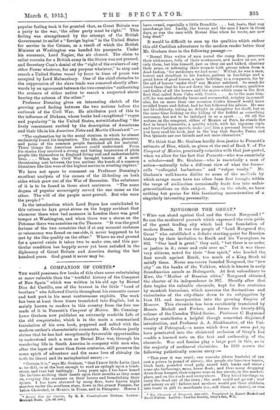PEACE IN FRICTION.* Tag centmy of peace between Great Britain
and the United States which the two countries are celebrating this year did not open with much promise. The war of 1812 might easily have been avoided, and the Treaty which brought it to a close left every cause of dispute between the two Powers still unsettled. Professor Dunning in his review of the relations between the two Powers since the signing of that Treaty says quite truly that "by all the canons of judgment that were warranted by history and by the conditions of the times the Peace made at Ghent could be merely a truce." The dispro- portion between the two countries in population, in military and naval resources, and in commerce eeemed to make the victory of Great Britain in any future contest overwhelmingly probable. In one direction the American hopes at the open. tog of the War had been disappointed. The conquest of Canada bad proved impossible. The English settlers had for the most part been driven_ across the frontier by the
• Ti. British Empire and the Unite! Sint.,. By W. A. Duetting, Ph.D., LL.D. Loudon: George Allen and Dewitt. [8.e. Bd. net. J
Revolution; the French population, though theyhad been under British rule for only half a century, had no love for their new neighbour the Republic. The peace was popular in the United States partly because it drew a veil over the Canadian defeat, and partly because their successes at Lake Champlain and New Orleans enabled the American people to retire front the field with an agreeable sense of victory. Just a year later the first of the questions left untouched by the Treaty of Ghent was disposed of by an agreement that the naval force maintained by both Powers on the Great Lakes should be 'restricted to four vessels each of a burthen not exceeding one hundred tons and armed with one eighteen- pound cannon. This limitation was embodied in the Treaty of 1818, an instrument which also settled the long disputes as to the liberty of Americans to fish in British waters.
Professor Denning does not find very much material in the period between 1818 and 1837. But in the latter year the Canadian frontier question came into prominence. Canada was no longer the contented community it had been at the conclusion of the Treaty of Ghent. In Lower Canada the antagonism between the elective Assembly and the nominated Council had become acute, and as far back ae 1832 the popular Chamber had refused to vote the money for the judicial and administrative services. The English Cabinet met this difficulty by inducing Parliament to authorize the Governor-General to pay the arrears without waiting for a vote of the Assembly. This led to sporadic attempts at rebellion which had no serious result beyond driving the leaders into American territory. There they organized a further series of raids, in the most serious of which a force of several hundred men seized an island on the Canadian side of the frontier. As their supplies were drawn from a small steamer, the 'Caroline,' the Government troops followed her to the American shore and there bnrnt hen This brought the diplomatiets into the field. The United States demanded reparation for the violation of American territory. The British Government justified the act as a necessary method of defence in time of war when the United States had become a base of supplies for the enemy. While the negotiations were slowly going on a British subject, one McLeod, who had had a hand in setting fire to the 'Caroline,' WASI arrested in New York State on a charge of arson and murder. Indignation raged high on both sides of the Atlantic. On this side the contention was that McLeod's action was covered by the responsibility of the British Government. On the other it was contended that the authority of the New York State Courts must be upheld. In 1841 Daniel Webster became Secretary of State. "He on the one band moderated the urgency of the British demands, and on the other moved all possible influences to insure that McLeod should not be convicted by the State Court. In October the accused man was (Raj, acquitted by a jury, and was hastily sent out of the State." By this means the particular dispute was got out of the way, and in the milder atmosphere thus created both the affair of the 'Caroline' and a somewhat earlier difference as to the boundary-line between Canada and Maine were amicably settled by the Webster-Aah button Treaty.
The most famous of the Treaties between the two countries was one which was in the end repealed to the satisfaction of both parties. This was the Clayton-Bulwer Treaty, concluded in 1840. It was intended to deal with the situation caused by the action of a British force in taking possession of the island of Tigre, on the Pacific coast, just a mouth after it had been ceded by its then possessors to the United States. Happily for the maintenance of peace, President Polk's term of office came to an end about the same time, and his successor was not disposed to make a quarrel. On our side Palmerston was equally ready to come to terms, and under the Treaty then concluded the two Governmenta pledged them. selves never to obtain any exclusive control over the canal then in contemplation across Central America. The immediate cause of alarm was thus removed, but from that moment the benefits anticipated from the Clayton-Balwer Treaty were exhausted. The contracting parties differed from the very first as to the meaning of its provisions, and half a century later the Treaty itself was expressly "superseded" by the Day-Panneefote Treaty of 1901. The Crimean War brought fresh troubles. "The causes and issues of that strange con- flict, grasped only with much difficulty by the experts; in Europe, were quite unintelligible in the United States, where
popular feeling took it for granted that, as Great Britain was a party to the war, 'the other party must be right:" This feeling was strengthened by the attempt of the British Government to enlist a' foreign legion" in the United States for service in the Crimea, as a result of which the British Minister at Washington was handed his passports. Under his successor, Lord Napier, the air cleared. The claim to enlist recruite for a British army in the States was not pressed, and Secretary C8,88's denial of the "right of the cruisers of any other Power whatever, for any purpose whatever," to stop and search a United States vessel by force in time of peace was accepted by Lord Malmesbury. One of the chief obstacles to the suppression of the slave trade was removed shortly after- wards by an agreement between the two zeuntries 'authorizing the cruisers of either nation to search a suspected slaver bearing the colours of the other."
Professor Dunning gives an interesting sketch of the growing good feeling between the two nations before the outbreak of the Civil War. He attributes part of this to the influence of Dickens, whose hooks bad exceptional "vogue and popularity" in the United States, notwithstanding 'the lively resentment excited by the description of Americans and their life in his American Notes and Marlin Chuszletvit" "The explanation lay in the social stratum in which he almost exclusively found his inspiration. The life, aspirations, pleasures, and pains of the common people furnished all his material. These things the American masses could understand. From his stories they received a strong and lasting impression of plain people like themselves in England living real and understandable lives. . . When the Civil War brought tension of a most threatening sort between the two nations the bonds of a common literature like this were of the highest service in averting rupture." We have not space to comment on Professor Dunning's excellent analysis of the causes of the ill-feeling on both sides which grew out of the War of Secession. The substance of it is to he found in three short sentences. 'The same dogma of popular sovereignty served the one cause as the other. The will of the people must prevail. But who were the people P " In the introduction which Lord Bryce has contributed to this volume he lays great stress on the happy accident that whenever there were bad manners in London there was good temper at Washington, and when there was a storm on the Potomac there wee sunshine on the Thames. "It was the good fortune of the two countries that if at any mouient rashness or vehemence was found on one side, it never happened. to he met by the like quality on the other." Where no real ground Ur a quarrel exists it takes two to nudie one, and this par- ticular condition has happily never yet been satisfied in the diplomacy of Great Britain and America during the last bundred years. God grant it never may be.











































 Previous page
Previous page